Cortisol Disorders
Cortisol Function
Glucocorticoids are hormones
that are produced by the zona
fasciculata of the adrenal
cortex. The name "glucocorticoid" derives
from their effects on glucose metabolism, and the fact
that they are steroid hormones of the the adrenal cortex.
Cortisol is the principal
glucocorticoid that is secreted.
Like other steroid hormones, cortisol binds to an intracellular receptor (the glucocorticoid receptor), which
mediates its effects by changing gene expression. As
indicated in the figure below, most cells in the body express
glucocorticoid receptors, and are thus targets of cortisol.
Cortisol has many diverse effects, but in general its role is to
ensure that cells in the body have an adequate response to stress. More specifically,
cortisol stimulates gluconeogenesis
in the liver, and promotes fat and protein breakdown.
Another important effect of cortisol is that it reduces inflammation and inhibits immune
function. For this reason,
glucocorticoids are important and widely used drugs in the
treatment of inflammatory disorders (e.g. asthma, inflammatory
bowel disease, psoriasis) and autoimmune diseases (e.g. lupus,
rheumatoid arthritis).
Regulation of Cortisol Secretion
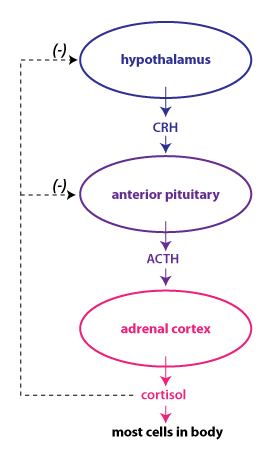 As shown in the figure at
right, cortisol is regulated by tropic hormones released
by the hypothalamus and anterior pituitary. The
hypothalamic hormone, CRH
(corticotropin releasing hormone) stimulates secretion of the
anterior pituitary hormone ACTH
(adrenocorticotropic hormone), which then stimulates cortisol
secretion.
As shown in the figure at
right, cortisol is regulated by tropic hormones released
by the hypothalamus and anterior pituitary. The
hypothalamic hormone, CRH
(corticotropin releasing hormone) stimulates secretion of the
anterior pituitary hormone ACTH
(adrenocorticotropic hormone), which then stimulates cortisol
secretion.
A distinctive feature of these hormones is that they regulate
their own secretion through negative
feedback. What this means is that cortisol binds to
its receptor on cells in the hypothalamus and anterior pituitary,
and has the effect of inhibiting secretion of its tropic
hormones. Less tropic hormone secretion leads to less
stimulation of cortisol secretion by cells in the adrenal cortex.
The usefulness of negative feedback inhibition is that it works
to keep hormone levels within a particular appropriate
physiological range. Consider a case where one adrenal gland is
damaged. This will cause decreased secretion of cortisol, and
there will be a decrease in the degree of negative feedback
inhibition on the hypothalamus and anterior pituitary. The reduced
negative feedback inhibition means that more CRH and ACTH will be
secreted. More ACTH will stimulate the remaining adrenal tissue to
grow and to secrete more cortisol. This will have the effect of
bringing cortisol back up towards its normal daily level of
secretion.
Disorders of Secretion
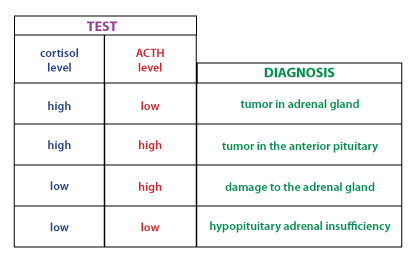 In order to accurately
determine the cause of abnormal cortisol secretion, one needs to
look not only at cortisol levels, but also at the level of its
tropic hormone, ACTH. It is also important to consider the
effect of negative feedback regulation. The table at right
summarizes the hormone levels that indicate particular diagnoses.
In order to accurately
determine the cause of abnormal cortisol secretion, one needs to
look not only at cortisol levels, but also at the level of its
tropic hormone, ACTH. It is also important to consider the
effect of negative feedback regulation. The table at right
summarizes the hormone levels that indicate particular diagnoses.
Cushing's syndrome (also
called Cushing syndrome) is the name given to hypersecretion of cortisol (or hypercortisolism). Cushing's
syndrome causes a very characteristic type of central obesity.
There is weight gain in the trunk and face, but a loss of muscle
mass and adipose tissue in the arms and legs. Hypercortisolism
also causes insulin resistance
(which can lead to the development of type 2 diabetes mellitus),
excessive bone resorption (which can lead to osteoporosis), and
hypertension.
The most common type of Cushing's syndrome is iatrogenic Cushing's syndrome.
"Iatrogenic" means caused by a medical treatment. Iatrogenic
Cushing's syndrome occurs in patients who must use high doses of
glucocorticoid drugs. Treatment with glucocorticoid drugs is
also the major cause of secondary adrenal insufficiency (see
below). Whenever a patient presents with symptoms of
hypercortisolism, a first step in diagnosis is to ask about drug
history in order to determine whether the cause is iatrogenic.
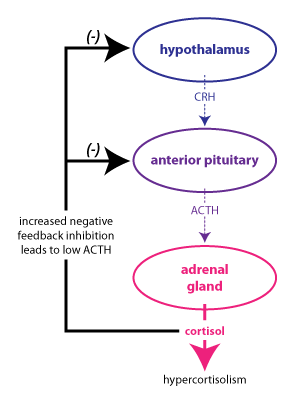
When Cushing's syndrome is due to a tumor
in the adrenal cortex, increased negative feedback
has the effect of decreasing secretion of tropic hormones.
Therefore, the level of ACTH will be
low. This is illustrated in the figure
at right.
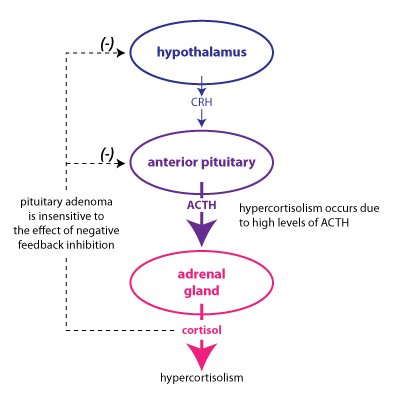
Alternatively, Cushing's syndrome might result because of
hypersecretion of ACTH. In fact, Cushing's syndrome is more
commonly caused by a pituitary adenoma (a pituitary tumor)
than by an adrenal tumor. Cushing's syndrome caused by a pituitary
adenoma is known as Cushing's disease.
The pituitary adenoma hypersecretes ACTH and is relatively
insensitive to feedback inhibition by cortisol. In Cushing's
disease due to a pituitary tumor, both
ACTH and cortisol levels will be high.
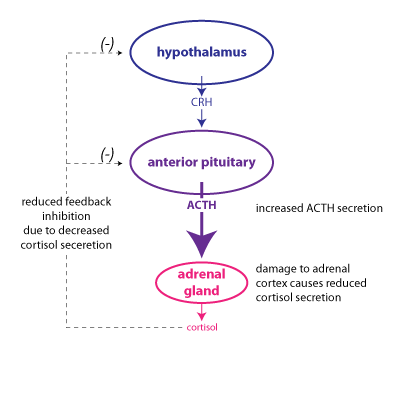
Hyposecretion of cortisol is
known as adrenal insufficiency.
Primary adrenal insufficiency is called Addison's
disease. ("Primary" is the term used for an
adrenal disorder when the problem originates in the adrenal
gland.) Addison's disease is most often due to an autoimmune
disorder but it can also result from infections such as
tuberculosis. Note that generalized damage to the adrenal cortex
will affect both the zona glomerulosa
and the zona fasciculata.
So in Addison's disease there is hyposecretion of both cortisol
and aldosterone, the steroid
hormone that regulates Na+ and K+ balance in
the extracellular fluid.
In primary adrenal insufficiency, decreased cortisol secretion
causes a release from negative feedback, and consequently, ACTH levels are high. In
practice, physicians will often use a challenge test to
make the diagnosis. The challenge test measures the ability of the
adrenal gland to secrete cortisol in response to exogenously
administered ACTH.
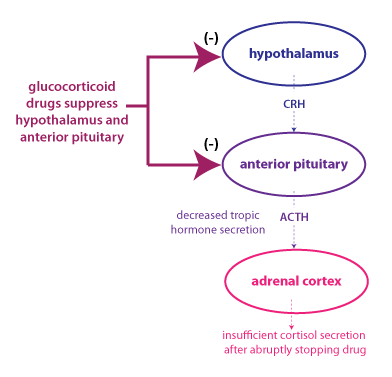 Secondary
adrenal insufficiency (or hypopituitary
adrenal insufficiency) describes the situation
where abnormally low ACTH levels lead to hyposecretion of
cortisol. Interestingly, the major cause of this disorder is high
dose glucocorticoid therapy. As mentioned above, glucocorticoids
are used therapeutically to treat inflammatory and autoimmune
diseases.
Secondary
adrenal insufficiency (or hypopituitary
adrenal insufficiency) describes the situation
where abnormally low ACTH levels lead to hyposecretion of
cortisol. Interestingly, the major cause of this disorder is high
dose glucocorticoid therapy. As mentioned above, glucocorticoids
are used therapeutically to treat inflammatory and autoimmune
diseases.
The diagram at left illustrates how glucocorticoids cause
hypopituitary adrenal insufficiency. Chronic high levels of
glucocorticoids lead to a suppression of ACTH secretion that can
sometimes persist for several months after glucocorticoid
treatment stops. When the glucocorticoid therapy is discontinued,
the result is hypocortisolism.
Because of this, an important component of treatment with
glucocorticoid drugs is that they are never stopped abruptly.
Instead, patients are instructed to gradually reduce the dosage of
glucocorticoid as they end therapy. Tapering the drug dosage
allows the pituitary gland to recover.
 As shown in the figure at
right, cortisol is regulated by tropic hormones released
by the hypothalamus and anterior pituitary. The
hypothalamic hormone, CRH
(corticotropin releasing hormone) stimulates secretion of the
anterior pituitary hormone ACTH
(adrenocorticotropic hormone), which then stimulates cortisol
secretion.
As shown in the figure at
right, cortisol is regulated by tropic hormones released
by the hypothalamus and anterior pituitary. The
hypothalamic hormone, CRH
(corticotropin releasing hormone) stimulates secretion of the
anterior pituitary hormone ACTH
(adrenocorticotropic hormone), which then stimulates cortisol
secretion. In order to accurately
determine the cause of abnormal cortisol secretion, one needs to
look not only at cortisol levels, but also at the level of its
tropic hormone, ACTH. It is also important to consider the
effect of negative feedback regulation. The table at right
summarizes the hormone levels that indicate particular diagnoses.
In order to accurately
determine the cause of abnormal cortisol secretion, one needs to
look not only at cortisol levels, but also at the level of its
tropic hormone, ACTH. It is also important to consider the
effect of negative feedback regulation. The table at right
summarizes the hormone levels that indicate particular diagnoses.


 Secondary
adrenal insufficiency (or hypopituitary
adrenal insufficiency) describes the situation
where abnormally low ACTH levels lead to hyposecretion of
cortisol. Interestingly, the major cause of this disorder is high
dose glucocorticoid therapy. As mentioned above, glucocorticoids
are used therapeutically to treat inflammatory and autoimmune
diseases.
Secondary
adrenal insufficiency (or hypopituitary
adrenal insufficiency) describes the situation
where abnormally low ACTH levels lead to hyposecretion of
cortisol. Interestingly, the major cause of this disorder is high
dose glucocorticoid therapy. As mentioned above, glucocorticoids
are used therapeutically to treat inflammatory and autoimmune
diseases.